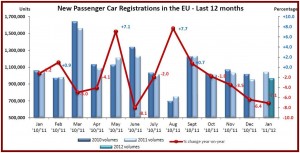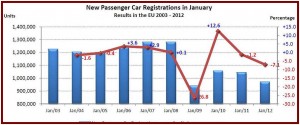
Europe is heading toward five straight years of declining auto sales. GM, Fiat-Chrysler and Ford shareholders should be wary of the negative effect on 2012 earnings.
EU car sales dropped yet again in January by 7.1% compared to a year ago, a troubling trend since car sales have declined for four straight years in the moribund European Union. The latest sales data from ACEA, the trade group of EU automakers, confirm what individual car company financial results have been indicating – the European economy continues to contract, and at rates greater than automakers anticipated as recently as last quarter or the quarter before that.
In total, 968,769 new registrations were recorded in the 26-nation EU region during January, which had on average one more working day than January 2011. Particularly hard hit were France (-20.7% for the second largest market) and Italy (-16.9% for the third largest market), with large negative consequences at PSA Group (-14.9%), Renault Group (-25.2%) and Fiat Group (-16.2 %.)
Germany (-0.4% for the largest EU market) and the United Kingdom (0% or flat for the fourth largest market) remained stable, with beneficial results for the biggest automaker in Europe, VW Group with its commanding 24% market share.
Ford Motor, even though sales were off 4.3% at 80,212, found itself in a tie for third largest automaker with the Renault Group, based on Ford’s strengths in the UK and to a lesser degree, Germany.
“The further weakening of the European industry, however, is a concern and illustrates why decisive action is needed to restore economic stability and improve consumer confidence.” said Roelant de Waard, Vice President, Marketing, Sales and Service, Ford of Europe.
He was echoing the wishes of all automakers whose pleas for expansionist economic policies during the past couple of years have been met with precisely the opposite from policy makers. Given unsustainable levels of debt, nothing but austerity looks in the hear term, which means most automakers are planning for 2012 to be another down year in the EU.
In spite of the strong German market – more than 210,000 vehicles in total – General Motors struggled with Opel, whose sales dropped -21% to 56,000 units. There’s a battle royal coming here as GM executives said yesterday that losses at GM Europe of $700 million during 2011 were simply unacceptable – it’s been more than a decade since it was profitable – and major restructurings would occur, even though Opel was not for sale.
This prompted the powerful Group Works Council of Opel/Vauxhall to issue a statement that said in part: “Worker Representatives and Management need to work on common solutions on the basis of the existing treaties – moreover in economically challenging times. The treaties provide for product and competence commitments and exclude plant closures and forced redundancies until 2014.”
As a kicker, the chairman, Wolfgang Schäfer-Klug, said: “In order to fully use the capacity of the European plants, the planned import of Opel/Vauxhall vehicles from other global regions to Europe needs to be reconsidered.”
The problem for GM is multifaceted, perhaps intractable:
- First, 2014 is too long to keep hemorrhaging cash at a company with a weak balance sheet just emerged from bankruptcy that will spend more than $8 billion in capital expenditures this year just stay competitive at roughly current global market share levels.
- Second, Chevrolet in the EU in January posted a large 27% increase on sales, at 15,719 vehicles, by importing cars. In 2012, Chevrolet is launching the Cruze station wagon and the Malibu mid-size sedan. It’s all part of GM’s plan to make Chevrolet its global volume brand.
No wonder, then, there is a large amount of friction between Opel and Chevrolet factions inside GM as both brands compete for the same customers. Worse, Chevrolet is increasingly turning to GM’s Korean subsidiary Daewoo as a source for small cars that Opel once designed and built exclusively. Opel’s future is clearly as a regional European brand in a market where it is struggling, so some sort of compromise is needed. Here, the strength of European labor laws and unions will complicate if not preclude the resolution of the issue.
Fiat, the owner of Chrysler has its hands full as well. Its sales as a group were down -16% to 67,980 Fiat, Lancia/Chrysler, Alfa Romeo and Jeep vehicles, largely because of the Fiat brand, followed by a troubled Alfa Romeo. Italy, where Fiat is headquartered and controls almost 30% of the market, is in danger of a complete collapse.
Yesterday Fiat withdrew its application for a $3.5 billion Advanced Technology Vehicles Manufacturing loan from the U.S. Department of Energy. At the same time to raise cash Fiat said it would issue bonds denominated in Swiss Francs worth CHF 425 million (U.S. $462 million) with a 5% interest rate due September 2015.
Right now Fiat’s plants are running at 50% of capacity, an ongoing financial disaster. When Fiat posted 2011 earnings earlier this month, it said that the events in last 12 months in Europe, especially the end of 2011, have “cast doubt on volume assumptions governing the overall market and Fiat’s development plans for Europe until 2014.”
Given the level of uncertainty about economic activity in Eurozone in near future, Fiat refused to make specific projections about financial performance. That can be said about most automakers operating there.
See also:
- Chrysler Group Posts a Modest 2011 Profit of $183 Million
- Ford Posts 2011 Profit of $8.8 Billion, Up $1B from 2010
- GM Posts Record $9.1 Billion Profit in 2011 – $7.6B on Common
- General Motors Revises Opel Supervisory Board. European Reorganization, Layoffs and Plant Closures Imminent?
- GM Q3 Earnings of $1.7 Billion, Most from North America
- GM Europe President Nick Reilly Retires in March 2012. Karl Stracke Assumes Role in January; Remains Opel/Vauxhall CEO
- EU Car Sales still Trending down for Fourth Straight Year
- Karl-Friedrich Stracke Confirmed as Opel Vauxhall CEO


